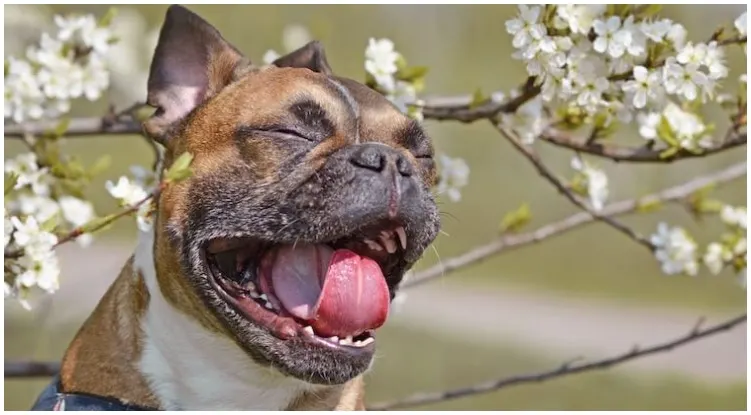Dogs sneeze just as frequently as we do! And boy, don’t they look absolutely adorable when they do. Dogs sneeze pretty much for the same reasons that we do: particles of dust, dirt, grass or pollen coming inside their nasal passages. Dogs are curious beings that love to roam around, so it perfectly fine that these triggers can cause sneezing pretty frequently. However, what to do when a dog won’t stop sneezing?
There are different reasons and scenarios in which your dog may have a hard time to stop sneezing.
The reason can be pretty harmless, however in some cases you will have to schedule an appointment with the vet. Especially if you are suspecting that the reason is connected to allergies. In that case your dog will require some special treatment to help him get his allergies under control.
Keep reading to learn about the most common reasons why a dog may won’t stop sneezing.
Sneezing while playing
Have you ever been peacefully playing with your dog and they just start sneezing out of nowhere?
Dogs signal each other when sneezing. They can sneeze to assure an atmosphere of non-aggression during playtime. It can also be a warning sign to their owners or playmates.
A Norwegian dog behaviorist named Turid Rugaas found out that dogs often sneeze to assure other dogs that everything is calm and friendly when they are in the middle of rough playing.
During a sneeze dogs can also destress. It’s another way for them do take a deep breath and calm down a bit.
Allergies
Your dog sneezing more frequently then usual can also be a sign of an allergy. That is especially common for seasonal allergies when your dog is exposed to pollen and other possible allergens.
In some cases even certain food allergies can trigger sneezing. Other possible allergens that could cause your dog to sneeze excessively are dander, mold, dust or mites. Dogs can develop allergies over time, and just because your dog wasn’t born with a certain allergy doesn’t mean he can’t develop it over time.
However, you can’t just self-diagnose or self-treat your dog, because you could do more harm than good. Many allergy symptoms can mimic the symptoms of other conditions. Let your vet do a physical examination before you start with any treatments.
Some other common allergy symptoms include: coughing, scratching/chewing and/or licking, red and irritated skin, vomiting and/or diarrhea.
The final diagnosis will be done by your vet, because these symptoms can be related to many other conditions.
Brachycephalic Airway Obstruction Syndrome (BAOS)
Dogs with Brachycephalic Airway Obstruction Syndrome are those absolutely adorable pups that you see with squashed faces, bulging eyes. The most common breeds with these features are: the Pekingese, French and English Bulldog, boxers, pugs, and the Boston terrier. These pups are genetically prone to developing different breathing difficulties because of their narrow nasal passages and unique airway structures. Symptoms of Brachycephalic Airway Obstruction Syndrome include wheezing, snorting, and sneezing. If you have a Brachycephalic dog, ask your vet on tips how to help your dog feel as comfortable as possible while experiencing some difficulties breathing. If your dog has severe problems, some prolonged medical treatment may be needed.
Reverse Sneezing
Besides sneezing the normal way, dogs can also additionally sneeze “in reverse” on some occasions. This usually happens when your dog snorts air into his nose quickly. The end results sound almost exactly like a conventional sneeze. It’s perfectly normal and you have absolutely nothing to worry about. This phenomenon is most common in smaller dogs, especially the ones with BAOS.
Medical Issues
Some different medical problems can also be the reason why your dog won’t stop sneezing. The most common conditions causing this are: kennel cough, respiratory infections, nasal mites, and much more. That’s why it’s always a good idea to schedule an appointment with your vet when your dog starts sneezing more often than usual.

